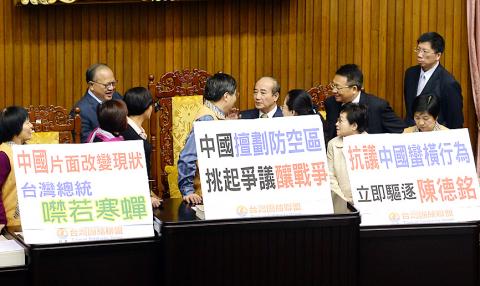The legislature’s caucus leaders, including the Chinese Nationalist Party (KMT), yesterday approved a non-binding resolution demanding that President Ma Ying-jeou’s (馬英九) administration lodge an official protest with China over its unilateral demarcation of an air defense identification zone (ADIZ) in the East China Sea.
The resolution asks Ma to file a stern protest against the Chinese demarcation, which it said has destabilized regional stability, and to take concerted action with the nation’s democratic allies by refusing to submit flight plans as Beijing has requested.
It also states that Beijing’s announcement of the ADIZ on Saturday last week and the Chinese aircraft carrier Liaoning’s passage through the Taiwan Strait on Thursday have escalated tensions that not only affect Taipei, but also Tokyo, Seoul and Washington.

Photo: Wang Yi-sung, Taipei Times
The resolution calls on China to exercise restraint, resolve the dispute with Japan, South Korea, Australia, Taiwan and the US through multilateral negotiations, and advises that China withdraw the demarcation to safeguard peace in the area.
Earlier yesterday, Taiwan Solidarity Union lawmakers had occupied the legislative podium to protest China’s action and called for a boycott of legislative proceedings. The deadlock was broken after Legislative Speaker Wang Jin-pyng (王金平) convened a cross-party meeting, and all party caucuses reached a consensus on the resolution.
However, the TSU’s proposal that visiting Association for Relations Across the Taiwan Straits Chairman Chen Deming (陳德銘) should be expeled was not included in the resolution.
The Executive Yuan issued a five-point statement in response to the resolution later yesterday.
First, the National Security Council had issued a four-point statement on Saturday last week in response to China’s ADIZ demarcation, in which it said that the government would firmly safeguard its sovereignty over the Diaoyutai Islands (釣魚台) and urges all concerned parties to exercise self-restraint to resolve regional disputes peacefully, the Executive Yuan said in the statement.
Second, China did not consult Taiwan before announcing its new ADIZ demarcation, which overlaps with Taiwan’s air defense zone and the Taipei Flight Information Region. This has not contributed to positive cross-strait relations, it said, adding that the government would “express our firm and serious concern to the mainland [China] through appropriate channels.”
Third, China’s air defense zone will not change how the military conducts operations in the region, and the military will increase inspections in the area to enhance air and sea defenses to protect national security and public interests, the statement said.
Fourth, the Civil Aeronautics Administration will handle issues related to the requirement imposed by China that commercial flights notify China before planes fly through the newly designated zone in line with related International Civil Aviation Organization regulations and based on requests made by airlines to ensure aviation safety, it said.
Fifth, the government is extremely concerned about how the situation develops and has made unequivocal calls to concerned parties to resolve disputes through bilateral or multilateral channels and in a peaceful manner to jointly maintain peace and stability in the region, the Executive Yuan said.
Executive Yuan spokesperson Cheng Li-wun (鄭麗文) declined to to elaborate when asked about the statement.

SECURITY: As China is ‘reshaping’ Hong Kong’s population, Taiwan must raise the eligibility threshold for applications from Hong Kongers, Chiu Chui-cheng said When Hong Kong and Macau citizens apply for residency in Taiwan, it would be under a new category that includes a “national security observation period,” Mainland Affairs Council (MAC) Minister Chiu Chui-cheng (邱垂正) said yesterday. President William Lai (賴清德) on March 13 announced 17 strategies to counter China’s aggression toward Taiwan, including incorporating national security considerations into the review process for residency applications from Hong Kong and Macau citizens. The situation in Hong Kong is constantly changing, Chiu said to media yesterday on the sidelines of the Taipei Technology Run hosted by the Taipei Neihu Technology Park Development Association. With

CARROT AND STICK: While unrelenting in its military threats, China attracted nearly 40,000 Taiwanese to over 400 business events last year Nearly 40,000 Taiwanese last year joined industry events in China, such as conferences and trade fairs, supported by the Chinese government, a study showed yesterday, as Beijing ramps up a charm offensive toward Taipei alongside military pressure. China has long taken a carrot-and-stick approach to Taiwan, threatening it with the prospect of military action while reaching out to those it believes are amenable to Beijing’s point of view. Taiwanese security officials are wary of what they see as Beijing’s influence campaigns to sway public opinion after Taipei and Beijing gradually resumed travel links halted by the COVID-19 pandemic, but the scale of

A US Marine Corps regiment equipped with Naval Strike Missiles (NSM) is set to participate in the upcoming Balikatan 25 exercise in the Luzon Strait, marking the system’s first-ever deployment in the Philippines. US and Philippine officials have separately confirmed that the Navy Marine Expeditionary Ship Interdiction System (NMESIS) — the mobile launch platform for the Naval Strike Missile — would take part in the joint exercise. The missiles are being deployed to “a strategic first island chain chokepoint” in the waters between Taiwan proper and the Philippines, US-based Naval News reported. “The Luzon Strait and Bashi Channel represent a critical access

Pope Francis is be laid to rest on Saturday after lying in state for three days in St Peter’s Basilica, where the faithful are expected to flock to pay their respects to history’s first Latin American pontiff. The cardinals met yesterday in the Vatican’s synod hall to chart the next steps before a conclave begins to choose Francis’ successor, as condolences poured in from around the world. According to current norms, the conclave must begin between May 5 and 10. The cardinals set the funeral for Saturday at 10am in St Peter’s Square, to be celebrated by the dean of the College